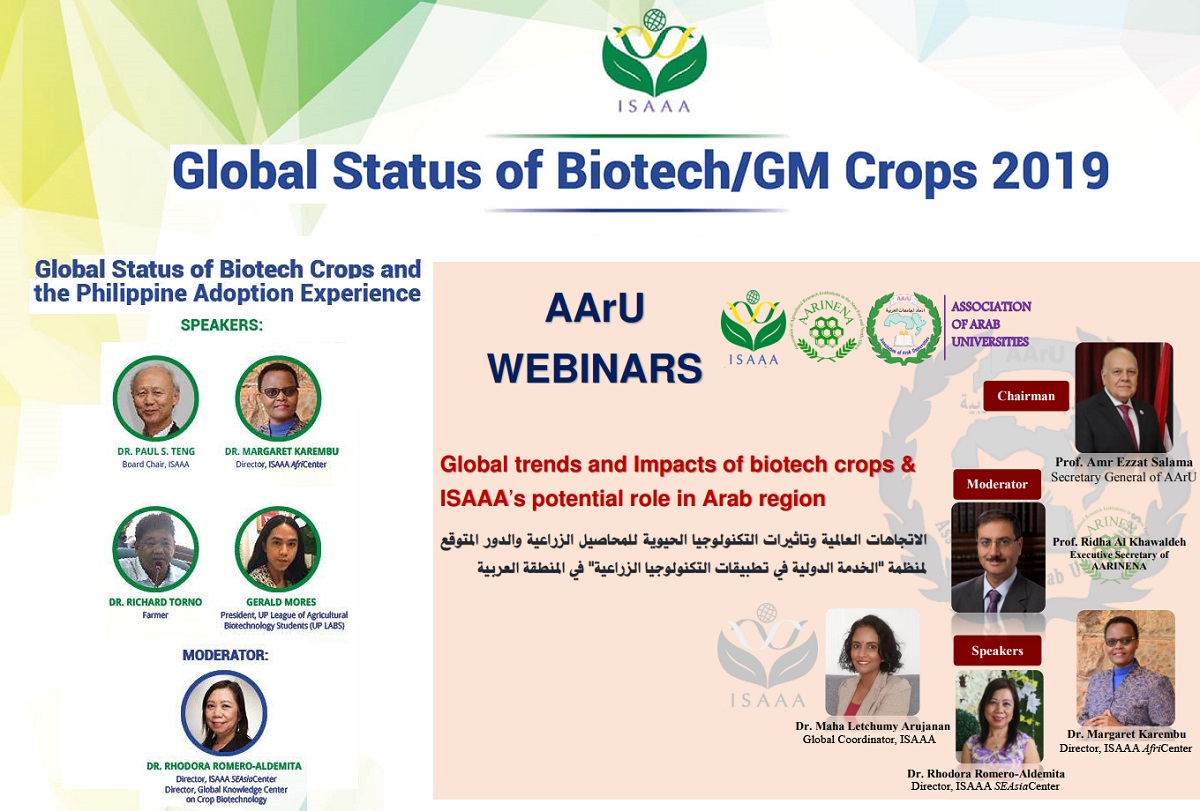
ISAAA Shares 2019 Global Biotech Crop Adoption to Stakeholders in the Philippines and Arab Region
December 16, 2020| |
The Philippines is the first country to plant a biotech crop in Southeast Asia and has become a model for science-based biosafety regulation in the region. In 2019, Filipino farmers boosted the area planted to biotech maize. This is according to the ISAAA report Global Status of Commercialized Biotech/GM Crops 2019 launched in the Philippines through a webinar on December 14, 2020. Another webinar was organized for Arab countries on December 9, 2020.
ISAAA SEAsiaCenter hosted the Philippine webinar which focused on the 2019 biotech crop status data and the Philippines' GM adoption experience as well as the youth's perspective on agricultural biotechnology. Dr. Richard Torno, a veterinarian by profession who later pursued farming, narrated his first-hand experience on how Bt corn improved his way of farming. According to him, Bt corn is effective against the Asiatic Corn Borer hence he applies fewer pesticides while still producing high-quality grains at a low production cost which ultimately led to an increase in yield by 37%. Gerald Mores, an Agricultural Biotechnology student from the University of the Philippines Los Baños (UPLB) and President of the UP League of Agricultural Biotechnology Students, provided insights about the future with biotechnology from the youth's perspective and how the youth can help change the course of agriculture for the better.
ISAAA, in partnership with the Association of Arab Universities (AArU) and the Association of Agricultural Research Institutions in the Near East and North Africa, presented the global trends and impact of biotech crops. ISAAA Global Coordinator, Dr. Mahaletchumy Arujanan, also introduced the advocacies of ISAAA and how it caters to the needs of those in the region. ISAAA SEAsiaCenter Director Dr. Rhodora Romero-Aldemita presented the 2019 global status and trends of GM/biotech crops, and ISAAA AfriCenter Dr. Margaret Karembu highlighted the impact of the benefits brought about by planting GM crops in Africa.
ISAAA will continue to hold webinars with its global partners. For more information, send an e-mail to knowledgecenter@isaaa.org.
| |
You might also like:
- Brief 55: Global Status of Commercialized Biotech/GM Crops: 2019
- Africa Leads Progress in Biotech Crop Adoption with Doubled Number of Planting Countries in 2019, ISAAA Reports
- ISAAA Webinar: Global Status of Biotech/GM Crops 2019
Biotech Updates is a weekly newsletter of ISAAA, a not-for-profit organization. It is distributed for free to over 22,000 subscribers worldwide to inform them about the key developments in biosciences, especially in biotechnology. Your support will help us in our mission to feed the world with knowledge. You can help by donating as little as $10.
-
See more articles:
-
News from Around the World
- ISAAA Short Course Highlights Relevance of Integrating Research, Science-based Regulation, and SciCom in Sustainable Agri Dev't
- ISAAA Shares 2019 Global Biotech Crop Adoption to Stakeholders in the Philippines and Arab Region
- Give a Gift of Knowledge
- Webinar: Biotech Crop Adoption in 2019 and Latin America's Experience
- NBMA Validates National Biosafety Guidelines on Gene Editing in Nigeria
- University of Florida Study Uncovers Vanilla DNA Mystery
- RNAi Pesticides Could Be the Next Big Tool in Agriculture
- US FDA Has Approved First GM Pig for People with Red Meat Allergies
- Chinese Scientists Develop Rice Variety Using Ion Beam Technology
- GM Tomato Enriched with L-DOPA Offers Affordable Medicine for Parkinson's Disease
-
Research Highlights
- Soybean Gene Overexpression Offers Resistance to SDS
-
Plant
- Biotech Research Perceived With Caution Globally, but Most Support Gene Editing for Therapeutics
-
Health
- WHO Calls for Actions to Encourage Acceptance and Uptake of COVID-19 Vaccines
-
Read the latest: - Biotech Updates (February 18, 2026)
- Gene Editing Supplement (January 28, 2026)
- Gene Drive Supplement (February 22, 2023)
-
Subscribe to BU: - Share
- Tweet

